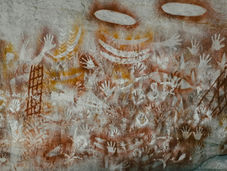Akkoub Thieves: The Relationship Between Food and Politics in 'Foragers' and 'Soup Over Bethlehem'
- Carina Najia
- Aug 10, 2023
- 3 min read
Updated: Aug 24, 2023

As a Palestinian living in London, I am always excited to hear about events that share and spotlight Palestine’s identity. Last Sunday, I was invited to SAFAR Film Festival at the Barbican, the UK’s largest festival of Arab cinema, where I was able to watch two films: the short Soup over Bethlehem by Larissa Sansour, and Foragers by Jumana Manaa.
Soup over Bethlehem
Soup over Bethlehem is a short about a typical Palestinian family, portrayed by director Larissa Sansour’s own family, sharing dinner on a rooftop, bonding over their love of a famous Middle Eastern dish: Mouloukhieh.
Although the Western world often shines a very bright spotlight on Arabic salads and grills such as tabouleh and shawarma, our vegetable stews (or yakhneh in Arabic) are not so well-known Mouloukhieh, a yakhneh made of Jute’s Mallow often compared to spinach, is one that Arabs have adored for generations.
To untrained tastebuds, Mouloukhieh may have a slightly slimy or watery texture, which is why Sansour’s family jokes that non-Arabs tend not to appreciate this dish the way that Arabs do. The conversation quickly turns to the Israeli appropriation of classic Palestinian dishes such as hummus and falafel, that which have been around for years before the existence of Israel. The short discusses the effects of claiming Palestinian dishes as Israeli, which Sansour’s family argues is a strategy to remove Palestinian identity in Israel.
Soup over Bethlehem speaks to the importance of the continued recognition of classic Palestinian dishes as Palestinian, and the symbolism of these dishes in relation to Palestinian identity.
Foragers
Foragers is a non-traditional documentary film by Palestinian director Jumana Manna that discusses the Israeli ban on the foraging of well-loved Palestinian akkoub (gundelia in English, a thistle-like plant resembling sunflower stems) and zaatar (wild thyme, used in a spice blend by the same name that consists of sumac and sesame seeds) from Palestinian land. Filmed in the Golan Heights and Jerusalem, Foragers explores the contrasts between the love and tenderness of foraging, which the film argues shows an appreciation and respect for Palestinian land, compared to the Israeli green patrol absurdly out to detain mostly elderly Palestinians who want to enjoy a simple pleasure that others in all corners of the world enjoy - the freedom and the right to pick food growing in the wild.
The Israeli occupation banned the foraging of zaatar in 1977, which, according to Manna, was based on the deduction that because Palestinians like zaatar, it was probably going to go extinct. Manaa argues that this decision was politically motivated and had no justification. In 2005, one study suggested that over-foraging akkoub can lead to fewer flowering plants, which lead the Israeli government to ban the foraging of wild akkoub by indigenous Palestinians. Manaa suggests that Israel passed these laws in order to push away Palestinians from their own land and cultures while also profiting off of it by fining Palestinians up to 600 shekels (or roughly £130) for foraging wild akkoub. Essentially, the ban on foraging well-loved plants inextricably linked to Palestinian identity—like zaatar and akkoub—from indigenous land presents yet another barrier for the indigenous Arabs expressing Palestinian identity.
Foragers is a family story, based on the experiences of Manna's parents, and filmed where she grew up. The film has a very personal touch, which is woven through the script, as the film re-enacts the experiences of real people who have been caught, trialled and fined for foraging akkoub and zaatar growing in the wild. The film also stars members of Manna’s own family, such as her aunts and uncles, and non-actor extras who recount their own personal experiences of being caught foraging for akkoub.
Manna represents foraging in this film as an act of continuous resistance and rebellion against the confiscation of Palestinian land by the Israelis, with indigenous Palestinians refusing to abide by this absurd law, and even when caught, refusing to pay the fines. The film speaks to peaceful resistance against the Israeli attempt to erase Palestinian identity, which is less explored in Western media.
Both Manna and Sansour’s portrayals of life in Palestine under the Israeli occupation are eye-opening and present very important and interesting perspectives on the barriers to expressing Palestinian identity in Palestine. Both films give voices to typical indigenous Palestinian families who are just trying to live a peaceful life in their homes.
Edited by Martha Knox, Co-Film & TV Editor






















Comments